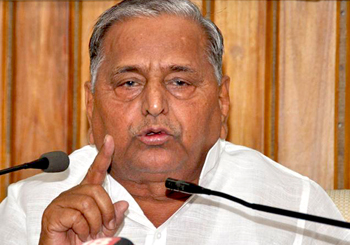Lucknow, Aug 19: SP supremo Mulayam Singh Yadav has kicked a fresh controversy with his comments on rape, saying while one man commits rape, four are named to "settle scores" and that rape by four persons was not "practical".
 This is not the first time that the former Uttar Pradesh Chief Minister has made shocking comments on rape. While opposing capital punishment for rape last year, he had sparked outrage by saying "ladke, ladke hain...galti ho jati hai (boys will be boys...they commit mistakes)."
This is not the first time that the former Uttar Pradesh Chief Minister has made shocking comments on rape. While opposing capital punishment for rape last year, he had sparked outrage by saying "ladke, ladke hain...galti ho jati hai (boys will be boys...they commit mistakes)."
Speaking on the law and order situation in the state at a function here, Yadav had said considering UP's population, the crime rate was "very low".
The SP supremo said that there were instances where only one person committed rape but the victim named four people merely to "settle scores".
"Innocent persons must not be implicated and harassed. There are cases, where a victim has accused four brothers of raping her. It is not practical," he said.
To stress his point, Yadav cited the alleged rape and murder case of two cousin sisters in Badaun stating that it was "blown out of proportion".
"The CBI probed the case and found out that rape was not committed at all. They were cold-blooded murders by the victim's cousins for property," he said.
"But even senior leaders like Congress President Sonia Gandhi's son Rahul rushed to Badaun and attacked the state government on the law and order front," he said.
Yadav's comments triggered a row with the BJP saying that the remarks were an "insult" to the fair sex and raise questions over the decisions given by courts in gangrape cases.
BJP spokesman Vijay Bahadur Pathak said, "There is nothing new in it. In the past also on the issue of rape, the SP supremo had said that youths tend to make mistakes.By giving this logic, Mulayam had showed insensitivity towards half of the population of the country.
"Such a statement is a gross insult to the fair sex and will ultimately lead to anarchy. It also raises question mark over decisions given by the courts in gangrape cases," Pathak said.
He alleged that it was an outburst of a leader, whose own party government, was "failing" to control law and order situation in the state.
"You can imagine the situation of a state where workers of the ruling party are acting like goons and rouges," he charged.
Congress said it would have been better if Mulayam had advised his son Akhilesh Yadav's government to take stern action against anti-social elements, instead of making such a statement.
"The biggest thing is that such a statement reflects SP supremo's disrespect towards women. Such a statement would embolden elements involved in crime against women specially rape cases," Congress spokesman Diwjendra Tripathi said.
"It would have been better, if he would have advised the government being run by his son to act tough against such elements," he said.
Senior RLD leader Anil Dubey said the comment was only an attempt to mislead the people.
"If the government is failing to check rumours, then it menas that it has also failed to check crime," he said.
With the UP government facing criticism over law and order situation, the SP supremo had yesterday hit out at the opposition saying an effort was being made to "defame" it and smear campaign was being run against it due to "political enmity". "Effort to defame the government is made due to political enmity," Yadav had charged.





Comments
Add new comment